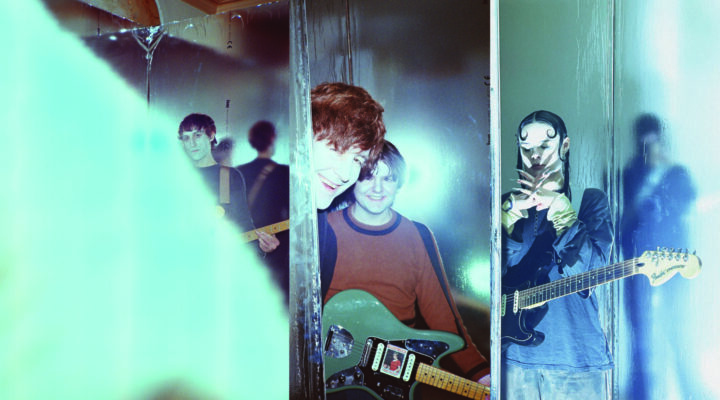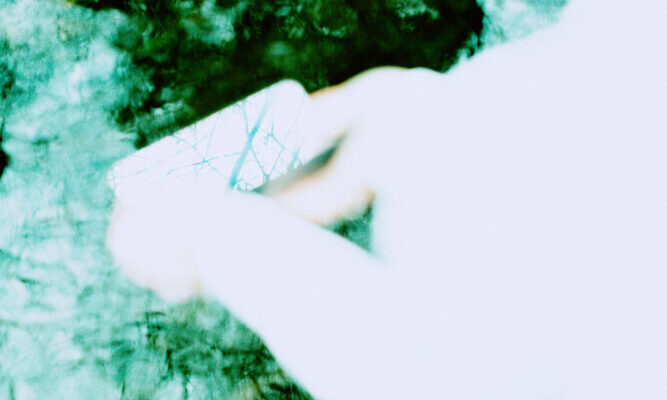Julia Holter
We’re ecstatic – Ekstasis drops on 8 March thanks to RVNG Intl. We asked bedroom-pop composer Julia Holter all about her subconscious nightlife. She told us about her tropical moments with the Kool-Aid man and why she woke up in a museum at 6 am one morning in LA. Dream a little dream with Julia.
‘I think it’s fascinating that dreams happen in an instant.’
Google Chat Interview by Johanna Valdés. Photos shot in Los Angeles by Ye Rin Mok.
How does your subconscious nightlife effect your everyday life?
Julia Holter: Well, I had a bad dream last night and it made me feel kind of shitty today.
What was it about?
I was walking down an endless stairwell and everyone was silent. It was solemn and terrifying.
How long did it last?
I have no idea. I think dreams only last for like a second but it seemed to drag on for hours.
Have you ever had a shared dream experience?
The Hammer Museum in LA had an event in discussion and celebration of sleep, where artists gathered to give lectures and workshops and perform music. The night culminated in a big giant group sleep. Sleeping bags at the museum, it was really fun. At 6 in the morning, we were woken up to discuss our dreams. There’s a video about it, I’m in it too! I’m the one in the Benji sleeping bag, talking about roofs seen from above.
What about that event stuck with you?
The most important thing I got out of that night was the emphasis in Laura Steenberge’s lecture: it is impossible to describe dreams with language, because none of it makes sense. I also think it’s fascinating that dreams happen in an instant.
Does anyone from your waking life visit you in your dreams? What forms do they take?
Yeah. They are all hybrids of people I know but never all at once. Laura Steenberge pointed out at her lecture that in dreams, things are always changing. From moment to moment, one person turns into another.
What are some peculiar details from your sleepy-time? Like vivid details or a recurring figure.
There are two recurring figures in the dreams of my childhood. One is the Kool-Aid man dancing on an island with a palm tree, and the other is a skeleton with a poison sign .
Does the poison ever get into the Kool-Aid?
No. That one still happens to me, though.
Scary…
It flashes — it’s here, it’s gone — before my eyes. It jolts me awake with a dissonant chord that is also gone in an instant.
Chords eh… how do your dreams relate to your sound?
I don’t use dreams to influence my music. At least not directly. My dreams are part of me and my music is really trying to be something outside of me.
What is the indirect effect?
There is something interesting about the subconscious as it relates to the way music can drift from one place to another for no logical reason. It sacrifices logical or chronological order for immediate momentary impressions.
Speaking of immediate momentary impressions, what made you start putting your own pieces together?
I had been writing music, in notation, for a long time when I started recording in my late college years. There’s an immediacy and also an intimacy to recording. I felt really freed by it.
Was that feeling something you’d anticipated in one of your childhood dreams?
No. I hated performing (because all I knew were piano recitals) and I didn’t think I could write music. It never occurred to me that I could be making my own music, in my own way, without an institution supporting me. I assumed I would have a stable job or something.
What about childhood dreams deferred: do you have any life goals on delay, waiting to explode?
No.
Really? You’re completely fulfilled?
Well, I’m not putting anything off on purpose. When I was 19 and miserable, I needed to fulfill the desire to create and form sounds that I liked. Once I did that, I felt a lot better about things. It would have been really devastating to have died before I figured that out.
Julia Holter is playing at Le Guess Who May Day on the 26th, other live dates: Muziekgebouw aan ‘t IJ on May 27th.



